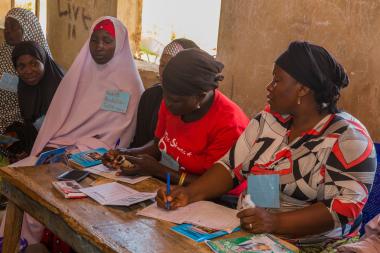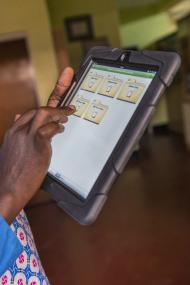We believe their needs count, their experiences count, and their progress counts. We also believe that we must do everything we can to ensure women have access to the information, resources, and support they need to improve their economic and social well-being.
But how do we learn about the needs and experiences of the women we serve? How can we measure their progress? How can we ensure that the information, resources, and support we offer do, in fact, improve their economic and social well-being? In recent years, WfWI has dedicated significant resources and attention to improving and expanding its Monitoring, Evaluation, Research, and Learning (MERL) portfolio to ensure our good intentions are delivering good results.
Measurement and data-based learning is not new to us. For many years, we’ve utilized surveys to track the social and economic well-being of the women we serve before they begin the program (baseline), at program graduation (endline), and up to two years after program graduation (follow-up). We’re proud of our historical monitoring systems, including the fact that we have a long history of conducting follow-up surveys both one and two years after women graduate from our program. This longitudinal data allows us to track participants’ progress over time and see whether the progress we see immediately after graduation is sustained (even once women leave our program.) And the good news is our data suggest it is! Our most recent graduate follow-up data suggests that the women we serve increase their monthly earnings from an average of $10 a month at baseline, to $36 a month at graduation, to $40 a month, two years after graduation.
We knew we could make our M&E systems even stronger though. Over the past several years, we set out to make improvements. We improved our core program survey by making our survey questions more objective, relevant, and reliable. We believe these changes will allow us to more accurately capture the progress women are making and improve our program based on stronger evidence.
Two examples of improvements:
- Our previous survey asked women to self-report their level of knowledge on topics covered in our program such as nutrition, family planning, or legal rights. The new survey uses objective questions to test women’s knowledge on these topics.
- Our previous survey captured earnings and savings; our new survey asks additional questions about how women use their time on both paid and unpaid labor so we can understand changes in time use and earnings on a more granular level.
Our surveys show great results, but there is only so much baseline and endline surveys can tell us. Even as our core survey data shows increased skills and increased earnings for many of the women we serve, it is difficult to know that WfWI is the cause of these improvements without a comparison group of community members who do not receive our program. As communities recover from conflict, perhaps all community members’ lives are improving, and not just the women we serve. To address this, WfWI is currently working on randomized-control trials (RCTs) in Afghanistan, the Democratic Republic of Congo, and Nigeria. These research projects will allow us to compare changes in participants’ lives with changes in the lives of women we don’t work with, to determine if women we’ve served are progressing more than other women in similar circumstances.
As WfWI expands into different types of programs – such as Men’s Engagement Activities or Advanced Economic Training – we are also expanding our monitoring and evaluation tools for complementary programs. This means developing new, more targeted surveys, but it also means expanding our toolkit to include more qualitative tools such as focus group discussions, business case studies, and life history interviews, such as those in display in this learning brief on pathways in and out of conflict and poverty in Rwanda and South Sudan. It means always looking for new ways to learn about what works (and what doesn’t) in empowering women.
Interested in learning more? You can reach out to our Director of Monitoring, Evaluation, Research and Learning at research@womenforwomen.org or just stay tuned! As part of our 25th Anniversary Match Her Courage campaign, we will publish a series of MERL-focused blogs through 2018, diving deeper into these topics, sharing our findings and our learning, and keeping our community updated on how MERL is evolving at WfWI. Because at WfWI we believe that women count, and we are committed to counting their needs, experiences, and progress to ensure we are delivering the best possible program for our sisters.
Andria Hayes-Birchler is the Director of Monitoring, Evaluation, Research, and Learning at Women for Women International.


